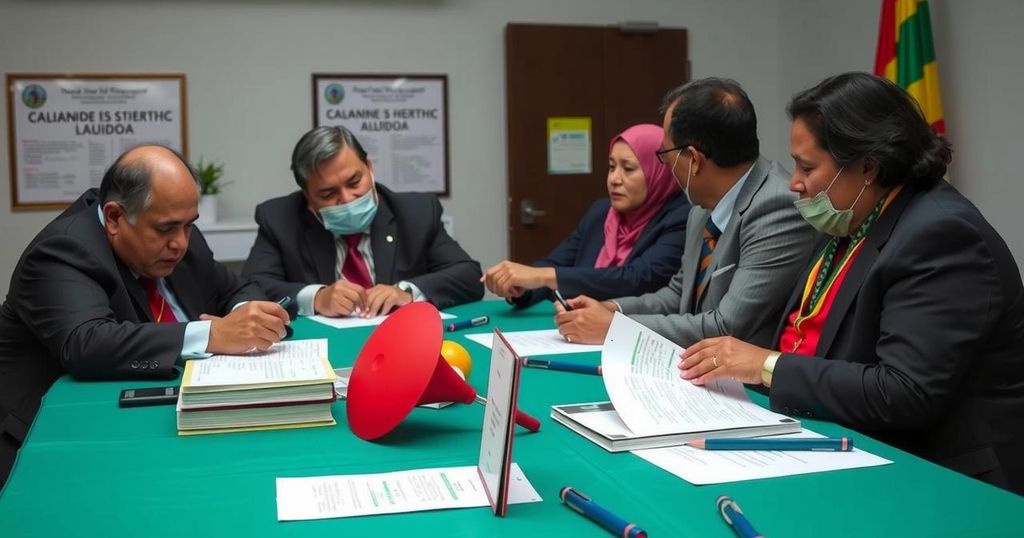Bolivia Faces Polarizing Judicial Elections Amid Political Unrest

Bolivia is set to hold controversial judicial elections amid political turmoil, where candidates bypass rally restrictions using unconventional promotional methods. Voter apathy prevails as many express confusion and dissatisfaction towards the electoral process, highlighting the risks of politicizing the judiciary. This election is particularly noteworthy as it is only a partial election, with significant implications for Bolivia’s democracy and judicial independence.
In Bolivia, a contentious popular vote for judicial positions is set to take place amidst a backdrop of political turmoil and public skepticism. Although campaigning is officially prohibited, candidates have covertly introduced their images and slogans into everyday products, as voter awareness on the ballot options remains limited. Bolivia remains unique as the only nation electing its top judges, a process now mirrored in Mexico following President Andres Manuel Lopez Obrador’s controversial judicial reforms. Critics argue that these electoral systems have significantly politicized the judiciary, transforming it into a mere tool of political ambition rather than a bastion of impartiality.
This situation has elicited widespread dissatisfaction among the populace, with many feeling disillusioned. As one voter expressed, “I’ll flip a coin,” highlighting the general apathy towards the judicial elections, which have evolved from a system based on credentials to one reliant on political power.
Experts have raised alarms over how such elections could undermine democratic checks and balances, illustrating a trend seen across several Latin American countries where judicial independence has been compromised. Even senior electoral officials in Bolivia have voiced concerns about the increasingly contentious nature of these elections, which were postponed amid a power struggle between President Luis Arce and former President Evo Morales.
The upcoming election represents a partial vote, with only four of the nine judges’ seats contested, effectively preserving the majority of the court’s current members. Historical precedents suggest that voter turnout may be low, as previously witnessed when most Bolivians chose to invalidate their ballots due to a lack of transparency in judicial selections. The situation in Bolivia is being closely monitored by neighboring Mexico, which may face similar judicial challenges in the near future.
The context of the upcoming vote in Bolivia is deeply intertwined with the nation’s complex political history and the unique decision to have judicial positions elected by popular vote rather than appointed based on professional qualifications. Since the adoption of this system over a decade ago, concerns have been raised regarding the implications of politicizing the judiciary for the country’s democratic integrity. Recent developments, including the postponement of the election by the Constitutional Court under political pressures, further highlight the contentious relationship between the judiciary and political factions within the country. The looming election, featuring only a partial ballot, reflects broader issues of accountability and transparency in Bolivia’s political sphere.
In summary, Bolivia’s upcoming judicial elections exemplify the challenges of a politically charged electoral system that many believe undermines the principles of an independent judiciary. With growing public disillusionment, a trend of low voter participation persists, raising significant concerns about the legitimacy and effectiveness of such elections in promoting a fair and democratic legal framework. As Bolivia observes political shifts at home, neighboring countries like Mexico are keenly observing the implications of this electoral model.
Original Source: www.voanews.com








